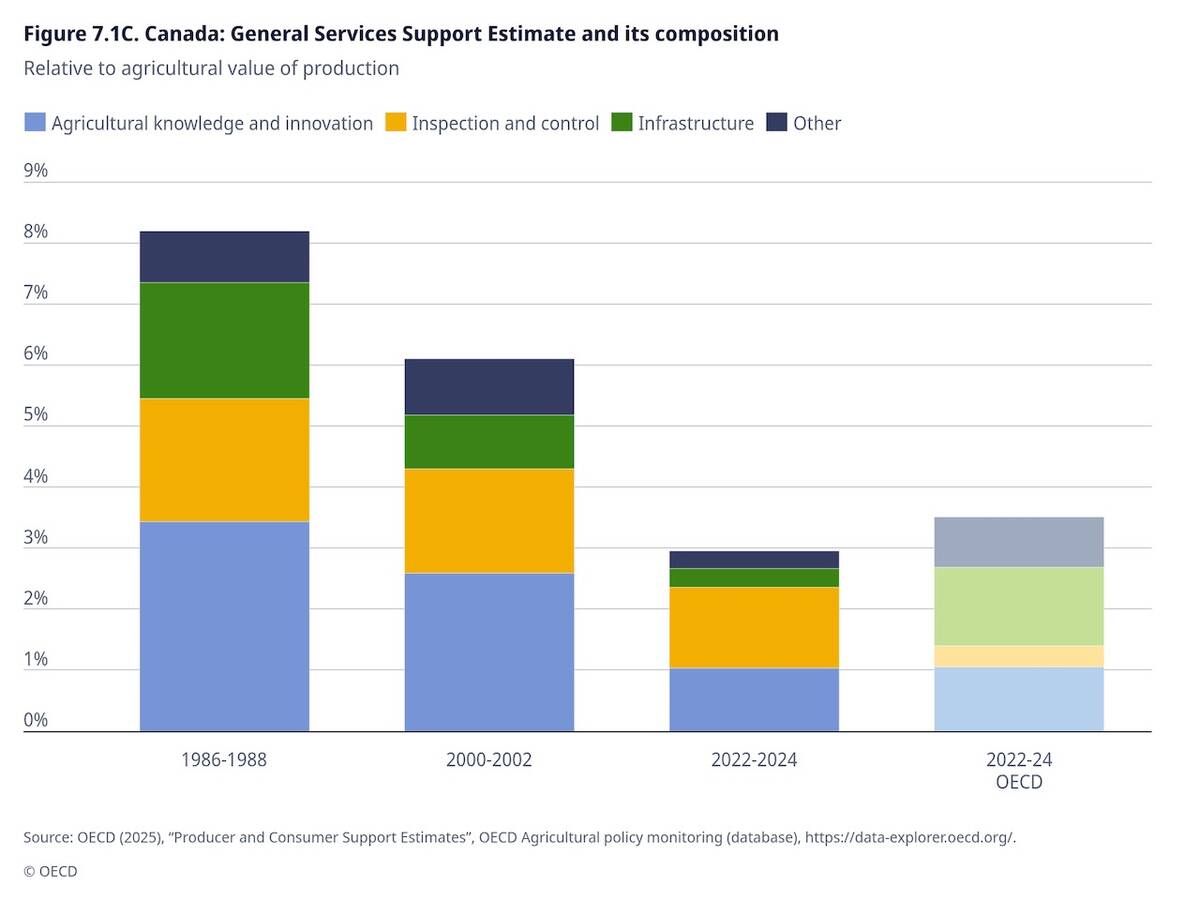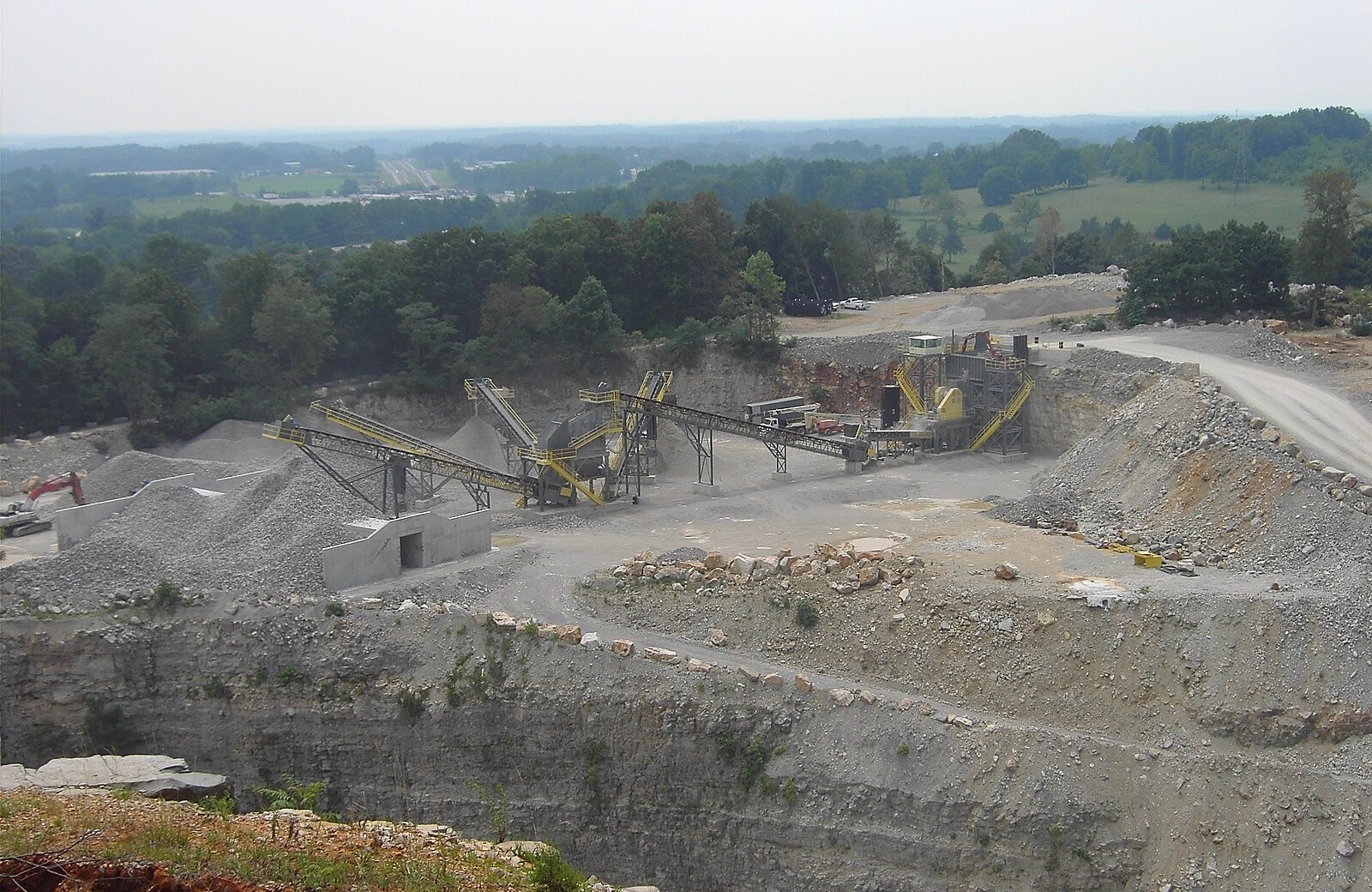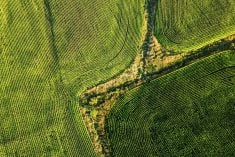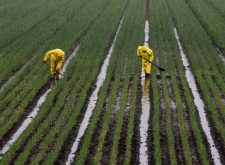Melancthon Township is once again facing a David-versus-Goliath fight to stop Strada Aggregates’ proposed below-the-water-table blast quarry near Horning’s Mills.
Why it matters: Mining aggregate can permanently alter farmland productivity and the watershed systems that supply farms and communities.
Strada Aggregates has applied to the Ministry of Natural Resources and Forestry (MNRF) to expand its existing Melancthon Quarry site under Ontario’s Aggregate Resources Act. The proposal would allow a 123.7-hectare extraction pit and a 65.7-hectare quarry within the current 149-hectare footprint, blasting about 200 feet below the water table and hauling two million tonnes of aggregate annually.
Read Also

OECD lauds Canada’s low farm subsidies, criticizes supply management
The Organization for Economic Co-operation and Development lauded Canada’s low farm subsidies, criticized supply management in its global survey of farm support programs.
Strada’s existing Pits 1, 2, and Melancthon Pit Extension licenses operate as a single pit for sand, gravel, and bedrock extraction above the water table only.
“Blasting and dewatering threaten to alter water flows, degrade wetlands, and reduce biodiversity,” wrote the Melancthon Against Quarry (MAQ) group in a Nov. 3 letter addressed to the MNRF, Strada and the Township of Melancthon.
“Limestone dust, which is alkaline, coats vegetation and soil, disrupting photosynthesis and altering soil chemistry. The result is reduced agricultural productivity and degraded natural habitats.”
The Ontario Farmland Trust (OFT) warns that aggregate mining permanently weakens farmland. A 2020 OFT report, ‘Impacts of Aggregate Mining on Farmland,’ cited an 2010 Ontario Ministry of Natural Resources study showing 93 per cent of aggregate deposits near high-demand areas overlap with farmland and natural features.
“Even if the land is rehabilitated back to a condition where agriculture is possible, it can never be as productive as it was before,” said the report. “The horizons of the soil have been destroyed, and the soil is no longer ideal for growing crops.”
This isn’t a case of blind “not-in-my-backyard” opposition. Dufferin County is no stranger to aggregate extraction operations.
Local opposition argues that the quarry threatens regional water systems and lacks transparency regarding blasting impacts and increased traffic.
MAQ said the project risks degrading water supplies from Melancthon to Mulmur, Shelburne, Alliston, Angus, Collingwood and Georgian Bay because the headwaters feed major rivers in Southern Ontario, including the Nottawasaga, Grand, Credit, Noisy, Mad, Pine and Boyne Rivers.
These waterways support sensitive ecosystems, including Brook trout habitats, that could face a 30 to 50 per cent reduction in stream flow during the dry season, according to independent hydrogeological models.
Jeannette McFarland, of Headwaters Community Trust (HCT), an organization dedicated to protecting the natural environment in the affected region, said Ontario has 6,000 licensed quarries and pits in the Greater Golden Horseshoe, with reserves to last at least 38 years without any new quarries.
“Water is in your backyard. It’s everyone’s problem,” said McFarland. “Once we start messing with it (the watershed) and diverting it, somebody might get the flooded fields, but you get the drought.”
That’s the message she’ll deliver to local municipalities, the Dufferin Federation of Agriculture, and the Ontario Federation of Agriculture, leading up to the proposal’s Nov. 10 public comment deadline.
In 2023, Strada signed a historic community engagement agreement with the North Dufferin Agricultural and Community Taskforce (NDACT), pledging transparency and cooperation. In return, NDACT agreed to oppose applications only when science demonstrated environmental harm.
MAQ claims trust eroded after hydrogeology research expert Garry Hunter’s January 2025 peer review report contradicted Strada’s findings and was dismissed.
“The site plans are the legal instrument, and you have to be absolutely reading every word on there, every detail,” Hunter told Melancthon residents at a Nov. 4 meeting in Horning’s Mills.
He said Strada hasn’t investigated or recognized the geotechnical constraints of a quarry approximately twice as deep as any existing one in the Niagara Escarpment landform.
This includes an aquitard—a low-permeability layer typically composed of clay, silt, or non-porous rock—mid-quarry that significantly restricts water flow in the subterranean stream essential to supplying Horning’s Mills town wells.
Redirecting this flow would lead to flooding of farmers’ fields and other areas.
“The strategy, I’m sure, from the applicants is to just keep throwing these reports out and hoping everybody will get tired and go away,” said Hunter.
MAQ also accuses Strada of reversing earlier assurances that I would not apply to blast below the water table.
“But now, this is exactly what it has done,” MAQ wrote. “This is part of a pattern of behaviour suggests that Strada is unwilling to engage transparently with the community. The Ministry cannot ignore this history when evaluating the company’s assurances.”
The company’s permit request to take up to five million litres of water a day for a decade to wash the aggregate, a Category 3 permit indicating high potential for environmental interference, has further raised concerns.
Mono Deputy Mayor Fred Nix told the Orangeville Banner that Dufferin County council will object to the application, with the lower-tier municipalities asked to follow suit.
Kyle Seeback, Conservative MP for Dufferin-Caledon, requested a clear, public response to 24 questions covering several application concerns in an Oct. 31 letter to Strada officials, including:
- withholding data such as the Model Virtual Transient Flows (monthly), streamflow monitoring results, private well data, and the Community WELLness Survey, despite repeated community requests.
- guidance on economic considerations related to jobs or community investments.
- potential environmental impacts within Ontario’s greenbelt.
- water-testing timelines, as well as notification or remediation protocols if contaminants are detected.
He said, given that the Melancthon site is situated within a highly vulnerable aquifer area, there is a noticeable lack of comprehensive documentation from the aggregate company confirming that groundwater quantity or quality will not be adversely affected, as required by the local Official Plan.
“Residents of Dufferin-Caledon have engaged in good faith to understand the implications of this project,” he wrote. “It is now Strada’s responsibility to match that good faith with full transparency and accountability.”
He urged Strada to respond publicly to these questions before the consultation period closes on Nov. 10, 2025.
“Only with complete and accessible information can our community – and I as its Member of Parliament – fairly assess this proposal,” Seeback concluded.















